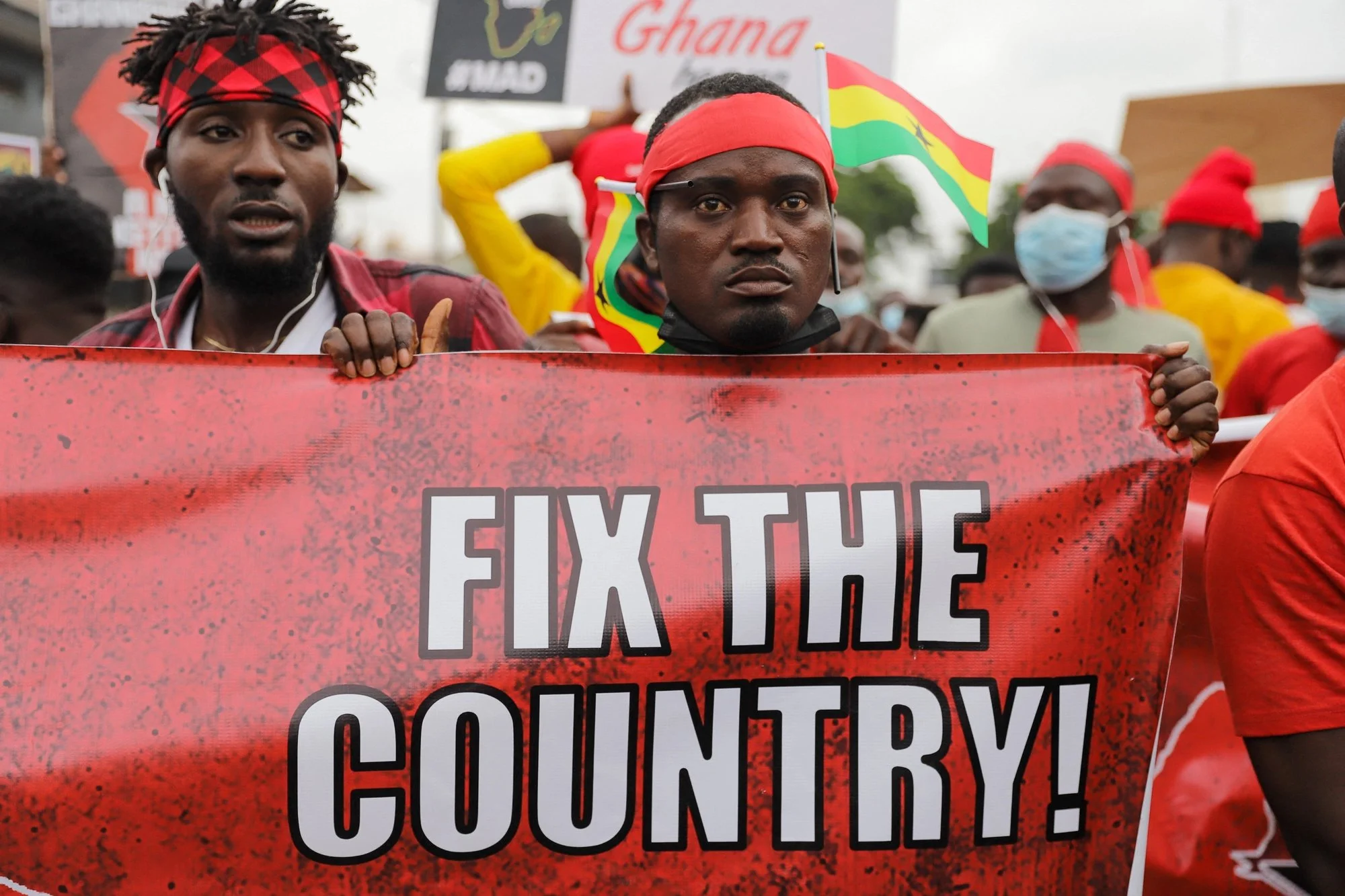In October 2019, I was a victim of police brutality during a protest in the center of Accra, Ghana’s capital. A fragment of a rubber bullet, fired by security forces, hit my throat. The police arrested me, hauling me and thirteen others to a local police station. We were then sprayed with hot water by an armed police squad who were sent to stop us from reaching the seat of government. Our simple goal that day was to petition our elected leaders to open up more opportunities for higher education and to allow the entry of working-class students into the Ghana School of Law to pursue careers in the legal profession.
Regrettably, this peaceful demonstration that turned to violence was not the first, nor has it been the last, of brutal state suppressions in one of Africa’s so-called ‘strongest democracies.’
Earlier in 2019, three of my colleagues were brazenly manhandled by police officers when we staged an action in parliament to prevent the construction of a controversial parliamentary chamber, which ultimately saved the nation $200 million.
Similarly, in 2020, when the Economic Fighters League organized a #BlackLivesMatter vigil in solidarity with George Floyd and victims of police brutality in the United States, armed police once again violently stormed our meeting and arrested our leader. Later at the police station, live bullets were fired by the police in an attempt to disperse the crowd calling for the release of our colleague. This action drew solidarity across the world, including #BlackLivesMatter chapters. The charges against our leader were later dropped.
During a later public vigil — which we organized to raise awareness about witchcraft killings in Ghana, after a 90-year-old woman was killed by members of her community — the police broke up the crowd and arrested Ernesto Yeboah, leader of the Economic Fighters League. For the next eleven months, we would spend much of our time going to and from court to fight the bogus charges that were leveled against him.
And when we started in early 2021 mobilizing for a series of demonstrations — under the #FixTheCountry aegis— the police were used to prevent our protests, often using dubious court processes to give the repression a veneer of legality. In the run-up to a major protest in August 2021, one of our activists, Mohammed Kaaka, was attacked in his home at dawn – he later died from his injuries. Anger and resentment inevitably started to boil over, as young people in the community began organizing. Heavily armed soldiers were called in and two more people were shot dead by their guns, a third was maimed. Today, a main convener of #FixTheCounty, Oliver Barker Vormawor, is standing trial on treason due to a simple Facebook post about a coup.
Activists in Ghana are not the only ones facing these threats. Critical journalists have been at the receiving end too. Investigative Journalist Manasseh Azure Awuni had to flee to South Africa for his life in 2019 after publishing a documentary about a private militia conducting trainings at a state security location. In the same year, Ahmed Suale, who was also an undercover investigative journalist, was shot dead near his home – this, after his cover was blown on national television by a sitting member of parliament who called for violence against him. That same MP is now one of the forerunners to become the ruling party’s presidential candidate.
Edward Adeti, a journalist with Starr FM, also fled the country due to threats on his life after revealing corrupt practices that led to the resignation of another minister.
Two journalists from modernghana.com, Emmanuel Ajarfor Abugri and Emmanuel Yeboah Britwum, were taken from their offices by armed police without a warrant, detained, and allegedly tortured. Their crime? They published a story about the national security minister.
I could go on. The list of abuses and the clampdown on freedom of speech is a growing one. The muzzling of dissent in Ghana — especially targeted at activists and journalists — is real.
Apart from physical violence — and the threat of it through the use of the state security forces — social media armies are now being employed to intimidate, harass, and silence people who question the status quo. This has resulted in many professionals engaging in self-censorship to avoid physical harm. This reality, however, is not well known in the region nor internationally. In fact, Ghana still maintains its reputation as a democratic standard-bearer, a safe haven for human rights defenders. It’s all marketing.
Ghana is often perceived and written about as a ‘beacon of democracy, peace and stability' in a troubled region. The state has mastered the art of milking this perception — as inaccurate as it may be — for all the public relations value it can offer. The country is heavily showcased outside of its borders, effectively masking the reality of repression that we have been forced to endure. International media, think tanks, and even artists participate in this charade, either knowingly or inadvertently.
The Economic Intelligence Unit recently described Ghana as a “flawed democracy.” Given the evidence I have experienced and seen, I would counter that what we have in Ghana today is a “constitutional dictatorship” – a system in which freedom of speech and assembly are constantly under threat of physical violence, social media harassment, and judicial repression.
Hardi Yakubu is the Movement Coordinator at Africans Rising, a Pan-African movement of activists and citizens who are working to secure peace and justice across the continent. Follow him on Twitter: @HardiYakubu
DISCLAIMER: The views expressed in this publication do not necessarily reflect the views of Vanguard Africa, the Vanguard Africa Foundation, or its staff.

